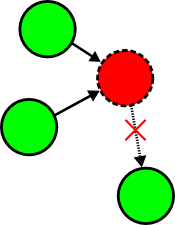nullprogram.com/blog/2009/04/16/
 There has been a lot of talk online about the fragility of URL
shortening services, particularly in relation to Twitter and its 140
character limit on posts (based on SMS limits). These services create
a single point of failure and break mechanisms of the web that we rely
on. Several solutions have been proposed, so over the next couple
years we get to see which ones end up getting adopted.
There has been a lot of talk online about the fragility of URL
shortening services, particularly in relation to Twitter and its 140
character limit on posts (based on SMS limits). These services create
a single point of failure and break mechanisms of the web that we rely
on. Several solutions have been proposed, so over the next couple
years we get to see which ones end up getting adopted.
There are many different URL shortening services out there. They take
a large URL, generate a short URL, and store the pair in a
database. Several of these services have already shut down in response
to abuse by spammers who hide fraudulent URLs behind shortened
ones. If these services ever went down all at once, these shortened
URLs would rot, destroying many of the connections that make up the
world wide web. This is called the rot link apocalypse, and it has
some people worried.
I am not very worried about this, though. I don't use Twitter, or any
other service that puts such ridiculous restrictions on message
sizes. Nor do I think information on Twitter is very important. Also,
this mass link rot will occur gradually, slow enough to be dealt with.
In any case, short URLs may be useful sometimes, especially if a URL
needs to be memorized or if the URL is extremely long. Or, it could be
used to get around a design
flaw in an inferior
browser.
One idea that I have not yet seen implemented is simple data
compression. When a short URL is needed, a user can apply a
compression algorithm to the URL. The original URL can be recovered
from this alone, so we don't have to rely on third parties to store
any data.
I have doubts this would work in practice, though. Generic compression
algorithms cannot compress such a small amount of data because their
overhead is too large in relation. Go ahead, try pushing a URL through
gzip. It will only get longer. We would need a special URL compression
algorithm.
For example, I could harvest a large number of URLs from around the
web, probably sticking to a single language, and use it to make a Huffman coding
frequency table. Then I use this to break URLs into symbols to
encode. The ".com/" symbol would likely be mapped to one or two
bits. Finally, this compressed URL is encoded in base 64 for use. The
client, who already has the same URL frequency table, would use it to
decode the URL.
URLs don't seem to have too many common bits, so I doubt this would
work well. I should give it a shot to see how well it works.
We probably need to stick with lookup tables mapping short strings to
long strings. Instead of using a third party, which can disappear with
the valuable data, we do the URL shortening at the same location as
the data. If the URL shortening mechanism disappears, so did the
data. The URL shortening loss wouldn't matter thanks to this
coupling. Getting the shortened URL to users can be tricky, though.
One proposal wants to
set the rev attribute of the link tag to
"canonical" and point to the short URL.
<link rev="canonical" href="http://example.com/FbVT">
To understand this one must first understand the rel
attribute. rel defines how the linked URL is related to
the current document. rev is the opposite, describing how
the current page is related to the linked page. To say
rev="canonical" means "I am the canonical URL for this
page".
However, I don't think this will get far. Several search engines,
including Google, have already adopted a
rel="canonical" for regular use. It's meant to be placed
with the short URL and will cause search engines to treat it as if it
was a 301
redirect. This won't help someone find the short URL from the long
URL, though. It is also likely to be confused with the
rev attribute by webmasters.
The rev attribute is also considered too difficult to
understand, which is why it was removed from HTML5.
Another idea rests in just using the rel attribute by
setting it to various values: "short", "shorter", "shortlink",
"alternate shorter", "shorturi", "shortcut", "short_url". This website does a good
job of describing why they are all not very good (misleading, ugly, or
wrong), and it goes on to recommend "shorturl".
I went with this last one and added a "short permalink" link in all
of my posts. (Removed after changing web hosts.) This
points to a 28 letter link that will 301 direct to the canonical post
URL. In order to avoid trashing my root namespace, all of the short
URLs begin with an asterisk. The 4 letter short code is derived from
the post's internal name.
I also took the time to make a long version of the URL that is more
descriptive. It contains the title of the post in the URL so a user
has an idea of the destination topic before following through. The
title is actually complete fluff and simply ignored. Naturally this
link's rel attribute is set to "longurl".
Keep your eyes open to see where this URL shortening stuff ends up
going.